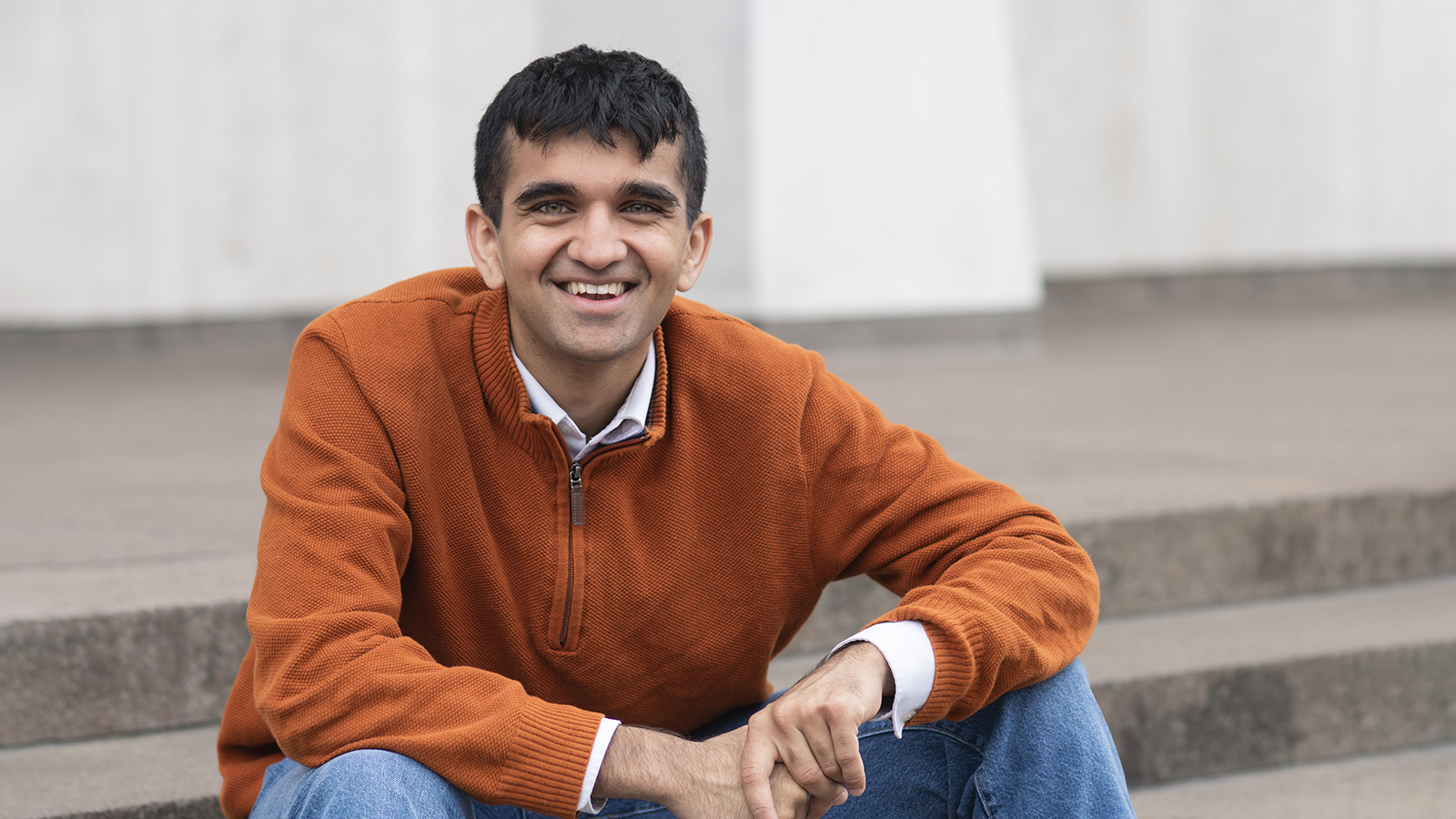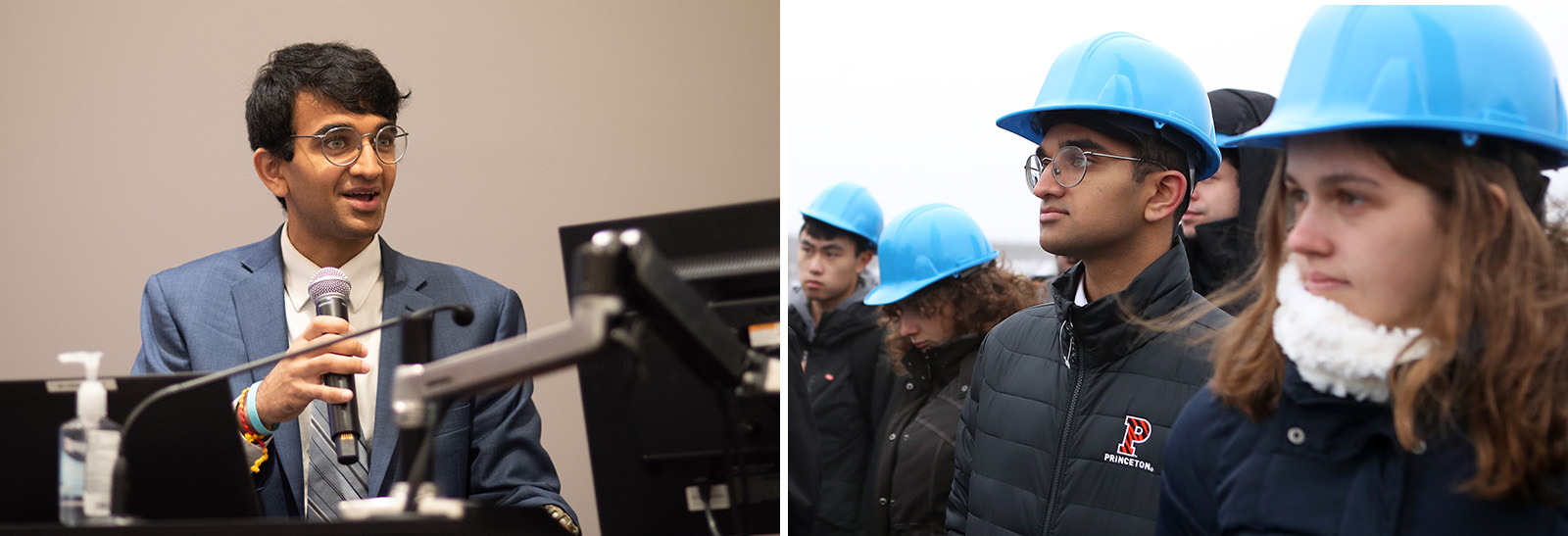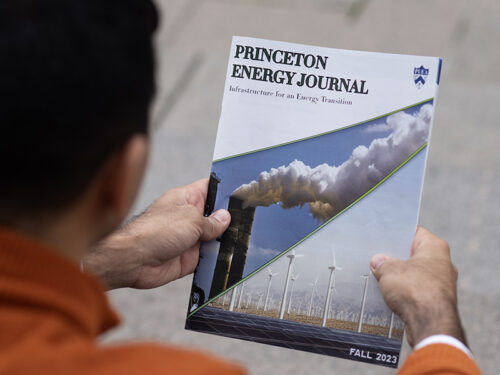
Vinay Konuru: Uniting the next generation of energy leaders
After a coast-to-coast bike trip ended in an accident near Death Valley National Park, Vinay Konuru found himself with a broken collarbone and an unexpected amount of free time.
Recuperating at his home in Florida in the summer before his sophomore year at Princeton, Konuru picked up every book he could get his hands on.
One book, The Grid by Gretchen Bakke, would change his trajectory as a student. It laid out the three-pronged problem of simultaneously building a bigger grid, updating outdated or failing infrastructure, and switching to intermittent clean energy sources like solar and wind.
“I remembered something I had heard once: that every generation has its own seemingly impossible challenge to solve,” said Konuru, who is now a graduating senior in electrical and computer engineering. “And when I was reading this book, it seemed clear to me that the defining challenge of my generation was going to be related to solving climate change.”
Although he had come to Princeton to study equity in education, Konuru then shifted his focus and dove headfirst into the most difficult energy problems he could find.
“I didn’t even know what the energy sector really was beyond a vague sense that things like utilities existed,” said Konuru, who has earned a certificate in sustainable energy. “But once I got started, I quickly found that there was an entire section of Princeton’s campus focused on energy.”
‘The energy sector is deeply interconnected’
Konuru returned to campus his sophomore year with a healed collarbone and a desire to learn as much as possible about energy. It was then that he discovered the Princeton University Energy Association (PUEA), a student-led organization dedicated to exploring the energy sector from a wide range of perspectives.
Hooked at once by the organization’s focus on engaging deeply with the energy transition, Konuru served as the director for the organization’s Fall 2022 conference, titled Toward a Cleaner Future. The conference moved beyond current technologies to address future energy and environmental challenges: the energy impacts of blockchain, the development of next-gen fuels, and the status of environmental justice in a changing energy landscape.
Konuru said the experience of organizing the conference taught him how to efficiently manage a team and exposed him to a wide range of active research areas on Princeton’s campus related to energy and the environment.
“I asked one of the speakers at the conference for advice on building an impactful career in energy, and they told me that the most successful leaders are the ones who have a multidimensional understanding of the energy sector — an intuition about the technical challenges, the policy challenges, and how the two interact,” Konuru said. “That advice helped me shape my path and the skillset I wanted to build for myself. I realized that because the energy sector is deeply interconnected, you can’t pigeonhole yourself if your goal is to have a wide-ranging impact.”

Doing the work now, not later
Not only did the speaker’s advice guide Konuru’s studies — leading him to study power electronics with Assistant Professor Minjie Chen, explore negative emissions technologies with Assistant Professor Kelsey Hatzell, and practice sustainable design thinking with Associate Professor Forrest Meggers — it also informed the experiences he wanted to cultivate outside of his coursework.
Elected president of PUEA following his work on the fall conference, Konuru restructured the organization to put the learning and skill-building needs of its student members first.
“We wanted to make sure that every single initiative we undertook added value to the lives of our members,” Konuru said. “I wanted PUEA to offer experiences to engage with the energy sector that they wouldn’t get anywhere else.”
For instance, when a roommate from New Orleans said the city government did not have the bandwidth to apply for a grant that would provide the city with electric vehicle-charging stations in historically underserved areas, Konuru galvanized PUEA into action.
Konuru reached out to city officials, asking if he could help them, and when they said yes, he assembled a team of volunteers from PUEA to help prepare a grant in a matter of weeks. While they were unsuccessful in the first round, they plan to reapply in the future.
“Climate change is such an overwhelming problem that I think it can be easy for students to feel disheartened,” Konuru said. “But being able to think big picture about the future of clean technologies, or how a seemingly small policy change could have a very large ripple effect, helps you stay motivated. Even if we weren’t successful, it helped us realize that we could make meaningful differences now, not later.”
Toward a cleaner future
Konuru said the New Orleans project is an example of one of his visions for PUEA to continue in the future. He hopes the organization can work with alumni to identify more opportunities for its members to assist in solving real-world issues, all while building valuable skillsets for their future.

As president of PUEA, Konuru also helped coordinate the launch of the Princeton Energy Journal, a student-led publication featuring deep dives into a range of energy topics. The publication was designed to allow students to explore the topics that most interested them while documenting their learning process. Articles in the inaugural issue cover subjects ranging from the future of battery technology to an analysis of nuclear fission rhetoric.
“We wanted to create something that would give people the freedom to pursue their interests while still showcasing their learning and honing their ability to communicate about complex topics,” said Konuru, who started his own blog when he was first exploring the energy sector as a way to share his learning with others.
As Konuru prepares to graduate from his time at Princeton, he said he is confident in the current direction of PUEA and looks forward to watching the organization grow. After graduation, Konuru plans to pursue a master’s in electrical engineering from Stanford University part-time while working in the energy sector on power congestion modeling to understand where the pain points are in the modern electricity system.
“One piece of advice I’d give to students is to not be afraid to take risks,” Konuru said. “Princeton is very good at supporting students who want to try new things. Some of the initiatives I’ve worked on that seemed like risks at the time have developed into some of the best communities I’ve ever been a part of.”
Minjie Chen is an assistant professor of electrical and computer engineering and the Andlinger Center for Energy and the Environment. Kelsey Hatzell is an assistant professor of mechanical and aerospace engineering and the Andlinger Center for Energy and the Environment. Forrest Meggers is an associate professor of architecture and the Andlinger Center for Energy and the Environment.